Life in the future教案
- 格式:doc
- 大小:42.00 KB
- 文档页数:5
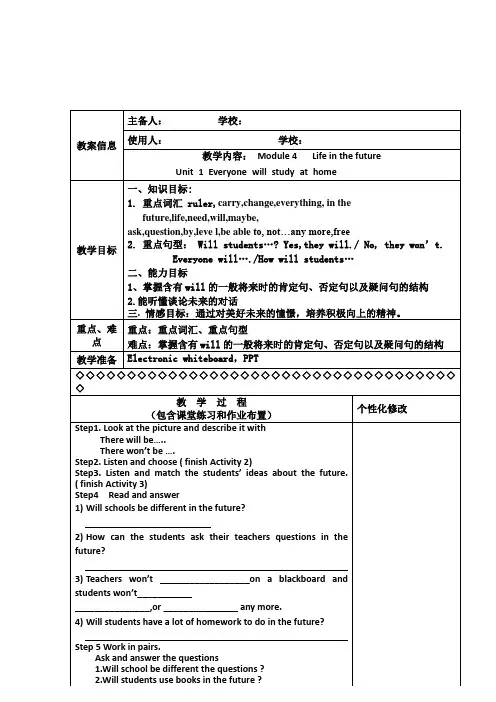
M4u1 教学设计学情分析:对于遗传变异这种普遍现象,学生在生活中经常接触、感受到,通过报刊、杂志、电视、网络等媒体也接触到基因、DNA等名词术语,但要从理论上阐述、分析这些现象,牵涉到得名词术语较多,而且学生还没有相应的化学知识,对理解染色体、DNA、基因等有机大分子比较困难。
效果分析:1、本设计把语言技能听说读写作为主要目标,学生学会将来时will的用法,效果较好。
2、学生能掌握单词,学会话题联想,掌握理解文章大意的阅读策略。
教材分析:本节课是外研版初中英语新课标教材的内容,本课先联系前面知识点“be going to”将来时的用法。
引出“will”的表达法。
然后通过学生问答,自主学习,掌握这两种将来时的用法。
本节内容们对未来概念的认识表达方法,是进行探究式教学的极佳素材。
在教学中,通过发挥教师的主导作用,优化课堂结构,妙用情景模拟,把知识的传授变为让学生在探究中学习实践方法,从而渗透科学方法教育。
评测练习:※Exercises:.根据音标提示写出所缺的单词。
1. Answer my _______________ [‘kwestʃən], please.2. The old woman is _______________ ['kærɪɪŋ] a big bag to the airport.3. We will be _________ [‘eɪbl] to speak English well.4. ___________ [meɪbi] the book is hers..5. Will the city ____________ [tʃeɪndʒ] in twenty years?6. The ticket(票) is _____________ [fri:] .You needn’t pay money.7. _______________ [‘evriθɪŋ] is different in this city.8.Your ___________ [‘levl] is very high.句型转换。
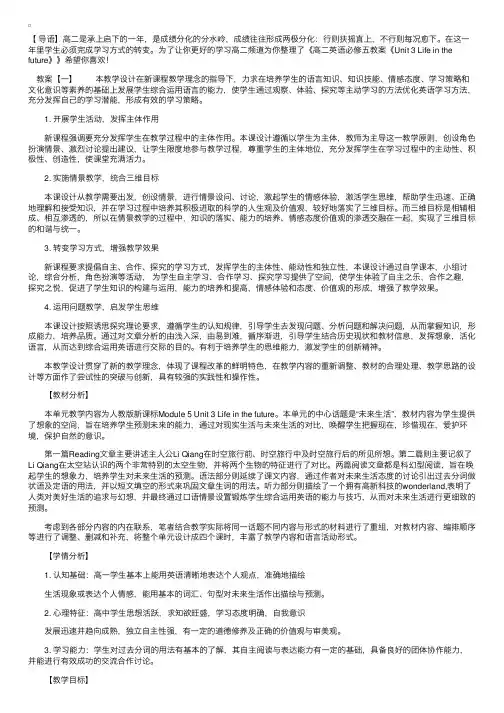
【导语】⾼⼆是承上启下的⼀年,是成绩分化的分⽔岭,成绩往往形成两极分化:⾏则扶摇直上,不⾏则每况愈下。
在这⼀年⾥学⽣必须完成学习⽅式的转变。
为了让你更好的学习⾼⼆频道为你整理了《⾼⼆英语必修五教案《Unit 3 Life in the future》》希望你喜欢! 教案【⼀】 本教学设计在新课程教学理念的指导下,⼒求在培养学⽣的语⾔知识、知识技能、情感态度、学习策略和⽂化意识等素养的基础上发展学⽣综合运⽤语⾔的能⼒,使学⽣通过观察、体验、探究等主动学习的⽅法优化英语学习⽅法,充分发挥⾃⼰的学习潜能,形成有效的学习策略。
1. 开展学⽣活动,发挥主体作⽤ 新课程强调要充分发挥学⽣在教学过程中的主体作⽤。
本课设计遵循以学⽣为主体,教师为主导这⼀教学原则,创设⾓⾊扮演情景、激烈讨论提出建议,让学⽣限度地参与教学过程,尊重学⽣的主体地位,充分发挥学⽣在学习过程中的主动性、积极性、创造性,使课堂充满活⼒。
2. 实施情景教学,统合三维⽬标 本课设计从教学需要出发,创设情景,进⾏情景设问、讨论,激起学⽣的情感体验,激活学⽣思维,帮助学⽣迅速、正确地理解和接受知识,并在学习过程中培养其积极进取的科学的⼈⽣观及价值观,较好地落实了三维⽬标。
⽽三维⽬标是相辅相成、相互渗透的,所以在情景教学的过程中,知识的落实、能⼒的培养、情感态度价值观的渗透交融在⼀起,实现了三维⽬标的和谐与统⼀。
3. 转变学习⽅式,增强教学效果 新课程要求提倡⾃主、合作、探究的学习⽅式,发挥学⽣的主体性、能动性和独⽴性,本课设计通过⾃学课本,⼩组讨论,综合分析,⾓⾊扮演等活动,为学⽣⾃主学习、合作学习、探究学习提供了空间,使学⽣体验了⾃主之乐,合作之趣,探究之悦,促进了学⽣知识的构建与运⽤,能⼒的培养和提⾼,情感体验和态度、价值观的形成,增强了教学效果。
4. 运⽤问题教学,启发学⽣思维 本课设计按照诱思探究理论要求,遵循学⽣的认知规律,引导学⽣去发现问题、分析问题和解决问题,从⽽掌握知识,形成能⼒,培养品质。
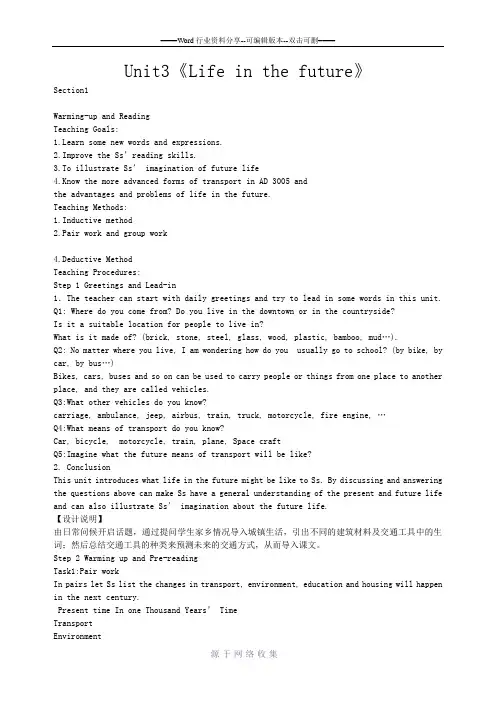
Unit3《Life in the future》Section1Warming-up and ReadingTeaching Goals:1.Learn some new words and expressions.2.Improve the Ss’reading skills.3.To illustrate Ss’ imagination of future life4.Know the more advanced forms of transport in AD 3005 andthe advantages and problems of life in the future.Teaching Methods:1.Inductive method2.Pair work and group work4.Deductive MethodTeaching Procedures:Step 1 Greetings and Lead-in1.The teacher can start with daily greetings and try to lead in some words in this unit. Q1: Where do you come from? Do you live in the downtown or in the countryside?Is it a suitable location for people to live in?What is it made of? (brick, stone, steel, glass, wood, plastic, bamboo, mud…).Q2: No matter where you live, I am wondering how do you usually go to school? (by bike, by car, by bus…)Bikes, cars, buses and so on can be used to carry people or things from one place to another place, and they are called vehicles.Q3:What other vehicles do you know?carriage, ambul ance, jeep, airbus, train, truck, motorcycle, fire engine, …Q4:What means of transport do you know?Car, bicycle, motorcycle, train, plane, Space craftQ5:Imagine what the future means of transport will be like?2. ConclusionThis unit introduces what life in the future might be like to Ss. By discussing and answering the questions above can make Ss have a general understanding of the present and future life and can also illustrate Ss’ imagination about the future life.【设计说明】由日常问候开启话题,通过提问学生家乡情况导入城镇生活,引出不同的建筑材料及交通工具中的生词;然后总结交通工具的种类来预测未来的交通方式,从而导入课文。
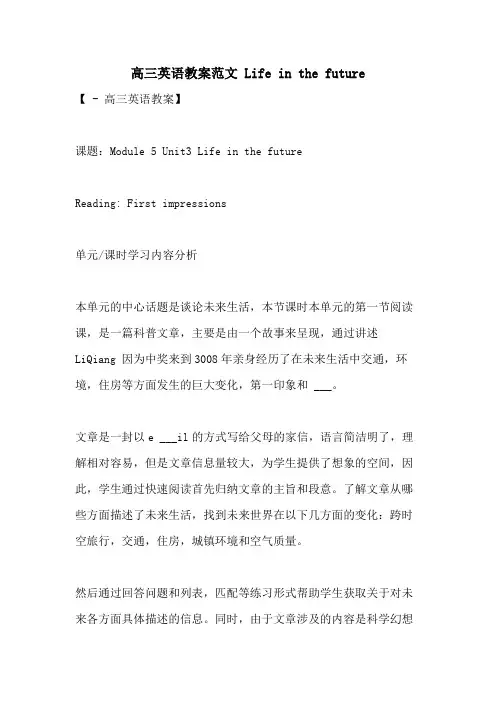
高三英语教案范文 Life in the future【 - 高三英语教案】课题:Module 5 Unit3 Life in the futureReading: First impressions单元/课时学习内容分析本单元的中心话题是谈论未来生活,本节课时本单元的第一节阅读课,是一篇科普文章,主要是由一个故事来呈现,通过讲述LiQiang 因为中奖来到3008年亲身经历了在未来生活中交通,环境,住房等方面发生的巨大变化,第一印象和 ___。
文章是一封以e ___il的方式写给父母的家信,语言简洁明了,理解相对容易,但是文章信息量较大,为学生提供了想象的空间,因此,学生通过快速阅读首先归纳文章的主旨和段意。
了解文章从哪些方面描述了未来生活,找到未来世界在以下几方面的变化:跨时空旅行,交通,住房,城镇环境和空气质量。
然后通过回答问题和列表,匹配等练习形式帮助学生获取关于对未来各方面具体描述的信息。
同时,由于文章涉及的内容是科学幻想的,学生生活实践中未能尝试和经历的,因此可以借助 ___以及与文章内容相关的flas ___等资源帮助学生理解信息,使学生对未来世界有一定的感观认识。
此外,学生通过获取关于对LiQing心理的描写判断其对未来的态度,并找出支持观点的论据或例子。
培养学生推理判断的能力。
在此基础上,学生对文中描述的未来生活得出自己的结论和判断。
对人类的活动进行反思,提倡环保的生活意识,最后通过本课的学习,学生进行发挥想象,对未来的生活环境和生活方式进行猜测。
培养学生发散性思维和创新精神。
学生基本情况简介高二学生能够运用基本词汇描述用英语简单描述现在和未来的生活,表达个人情感和个人观点,学生具备基本的阅读能力,如概括文意,猜测词义,获取实事细节等。
掌握了一些简单的阅读技巧及方法,如略读,找读,跳读等。
但是学生缺乏对文字传达的信息的准确理解。
因此学生在人物对未来生活的态度进行判断时,容易形成思维定势,主观臆断。
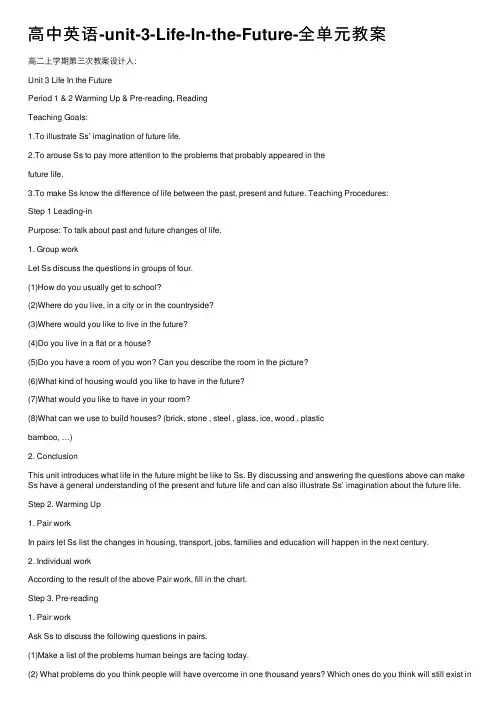
⾼中英语-unit-3-Life-In-the-Future-全单元教案⾼⼆上学期第三次教案设计⼈:Unit 3 Life In the FuturePeriod 1 & 2 Warming Up & Pre-reading, ReadingTeaching Goals:1.To illustrate Ss’ imagination of future life.2.To arouse Ss to pay more attention to the problems that probably appeared in thefuture life.3.To make Ss know the difference of life between the past, present and future. Teaching Procedures:Step 1 Leading-inPurpose: To talk about past and future changes of life.1. Group workLet Ss discuss the questions in groups of four.(1)How do you usually get to school?(2)Where do you live, in a city or in the countryside?(3)Where would you like to live in the future?(4)Do you live in a flat or a house?(5)Do you have a room of you won? Can you describe the room in the picture?(6)What kind of housing would you like to have in the future?(7)What would you like to have in your room?(8)What can we use to build houses? (brick, stone , steel , glass, ice, wood , plasticbamboo, …)2. ConclusionThis unit introduces what life in the future might be like to Ss. By discussing and answering the questions above can make Ss have a general understanding of the present and future life and can also illustrate Ss’ imagination about the future life. Step 2. Warming Up1. Pair workIn pairs let Ss list the changes in housing, transport, jobs, families and education will happen in the next century.2. Individual workAccording to the result of the above Pair work, fill in the chart.Step 3. Pre-reading1. Pair workAsk Ss to discuss the following questions in pairs.(1)Make a list of the problems human beings are facing today.(2) What problems do you think people will have overcome in one thousand years? Which ones do you think will still exist inAD 3008?Suggested Answers:①The first problem I would like to point out is the decline of morality.(道德沦丧)②The second problem is the racial bias problem. (种族歧视)③The third problem , which is a most serious problem , is the rapid depletion of resources on the Earth. (资源匮乏)④Now I come to the fourth problem, the problem of the large gap between the poor and the rich . (贫富悬殊)⑤The fifth problem is the pollution problem.(环境恶化)⑥Now I would like to talk about the sixth problem, the expensive arms race problem. (军备竞争)。
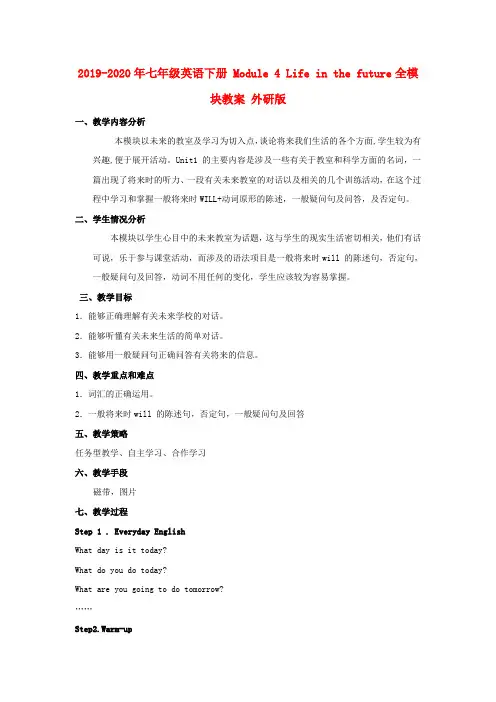
2019-2020年七年级英语下册 Module 4 Life in the future全模块教案外研版一、教学内容分析本模块以未来的教室及学习为切入点,谈论将来我们生活的各个方面,学生较为有兴趣,便于展开活动。
Unit1的主要内容是涉及一些有关于教室和科学方面的名词,一篇出现了将来时的听力、一段有关未来教室的对话以及相关的几个训练活动,在这个过程中学习和掌握一般将来时WILL+动词原形的陈述,一般疑问句及问答,及否定句。
二、学生情况分析本模块以学生心目中的未来教室为话题,这与学生的现实生活密切相关,他们有话可说,乐于参与课堂活动,而涉及的语法项目是一般将来时will 的陈述句,否定句,一般疑问句及回答,动词不用任何的变化,学生应该较为容易掌握。
三、教学目标1.能够正确理解有关未来学校的对话。
2.能够听懂有关未来生活的简单对话。
3.能够用一般疑问句正确问答有关将来的信息。
四、教学重点和难点1.词汇的正确运用。
2.一般将来时will 的陈述句,否定句,一般疑问句及回答五、教学策略任务型教学、自主学习、合作学习六、教学手段磁带,图片七、教学过程Step 1 . Everyday EnglishWhat day is it today?What do you do today?What are you going to do tomorrow?……Step2.Warm-upT: What will you do at this weekend?S: I will do my homework at this weekend..T: Will you play the piano this afternoon?S: Yes, I will /No, I will not.………Like this, ask the students to work in pairs to review the future tense.Step2. PresentationT: What will you do at this weekend?Help the students answer: I will play games at this weekend.(用be going to+do引出will+do,使同学们在很自然的复习语境中导入到新课)Ask the students to work in pairs to practice will+do.Step3.Vocabulary(1) Use the pictures to teach the new words :cable, , cell phone, , paper, ruler, satellite TV.(2)guessing games :What do you use to learn math and science ? calculatorWhat do I use to teach English? chalk(3)Let students repeat the words loudly.(创设情景教单词,使学生自然地掌握了单词的读音和用法。
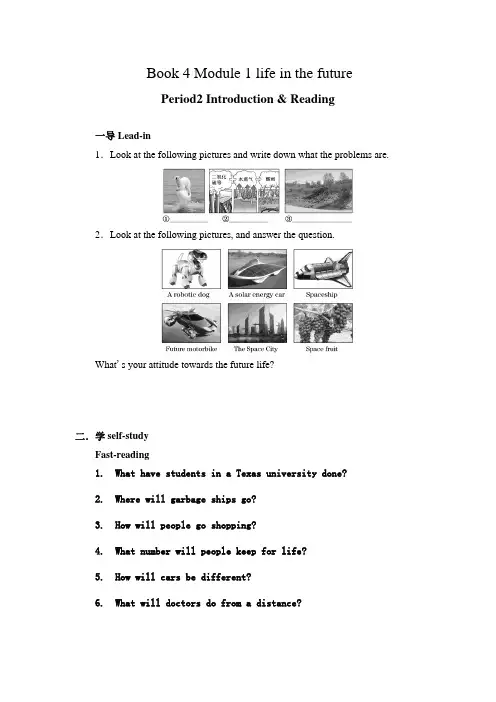
Book 4 Module 1 life in the futurePeriod2 Introduction & Reading一导Lead-in1.Look at the following pictures and write down what the problems are.2.Look at the following pictures, and answer the question.What's your attitude towards the future life?_________________________________________________________________ _________________________________________________________________ _________________________________________________________________ 二.学self-studyFast-reading1. What have students in a Texas university done?2. Where will garbage ships go?3. How will people go shopping?4. What number will people keep for life?5. How will cars be different?6. What will doctors do from a distance?三、展Check the students’ answers and show them correct answers.四、练Practicecareful-readingRead the text carefully and choose the best answers.1.Why will care for the environment become very important in the future?A.Because earth's natural resources run out.B.Because we will use lots of recycled materials, such as plastic, aluminum, steel, glass, wood and paper.C.Because we will waste fewer natural resources.D.Because we will also have to rely more on alternative energy.2.What does the word “landfill〞mean in the text?A.An area of land where large amounts of waste materials are buried under the earth.B.The process of burying large amounts of waste materials.C.Waste materials that will be buried.D.A piece of land in the valley.3.What is not mentioned as an idea for running the future city?A.Holidays at home.B.Telesurgery.C.Attending school at home. D.Recreation.4.Which of the statements is NOT true according to the text?A.No one is allowed to smoke in the city.B.All shopping will be done through computers.C.Common people can travel in space.D.Children can't have phones and phone numbers.五、结(summary)___________________________________________________________ _____________________________________________________________________ _____________________________________________________________________。
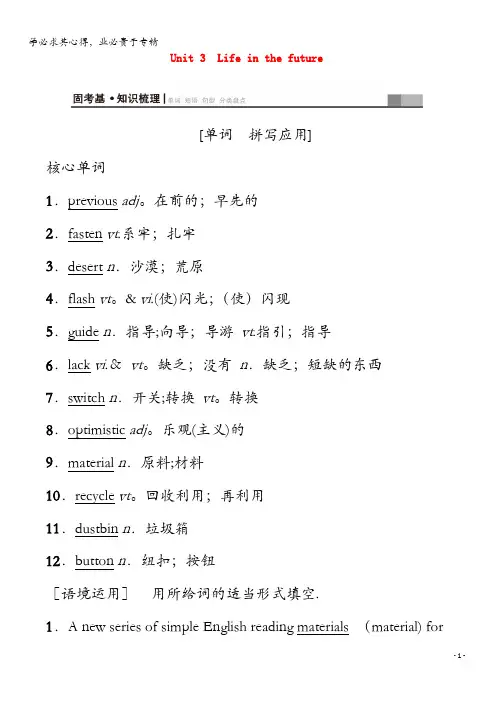
Unit 3 Life in the future[单词拼写应用]核心单词1.previous adj。
在前的;早先的2.fasten vt.系牢;扎牢3.desert n.沙漠;荒原4.flash vt。
& vi.(使)闪光;(使)闪现5.guide n.指导;向导;导游vt.指引;指导6.lack vi.&vt。
缺乏;没有n.缺乏;短缺的东西7.switch n.开关;转换vt。
转换8.optimistic adj。
乐观(主义)的9.material n.原料;材料10.recycle vt。
回收利用;再利用11.dustbin n.垃圾箱12.button n.纽扣;按钮[语境运用]用所给词的适当形式填空.1.A new series of simple English reading materials (material) formiddle school students has come out this year。
2.With the man guiding(guide) us ahead,we had no trouble finding the village.3.According to the airline rules,we suggest you (should)_switch (switch)off your mobile phone before boarding。
4.All passengers on board are expected to_fasten(fasten) the seat belts when the plane takes off and lands.5.Paper,iron and glass are all materials which can be_recycled(recycle) and reused again.拓展单词1.tolerate vt.容忍;忍受→tolerance n.容忍2.impress v.(使)留下深刻印象→impression n.印象;感想;印记→impressive adj.给人深刻印象的3.constant adj.时常发生的;连续不断的→constantly adv。
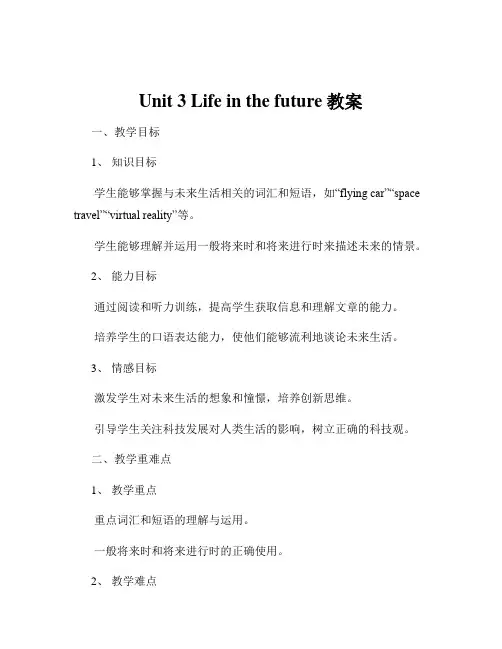
Unit 3 Life in the future教案一、教学目标1、知识目标学生能够掌握与未来生活相关的词汇和短语,如“flying car”“space travel”“virtual reality”等。
学生能够理解并运用一般将来时和将来进行时来描述未来的情景。
2、能力目标通过阅读和听力训练,提高学生获取信息和理解文章的能力。
培养学生的口语表达能力,使他们能够流利地谈论未来生活。
3、情感目标激发学生对未来生活的想象和憧憬,培养创新思维。
引导学生关注科技发展对人类生活的影响,树立正确的科技观。
二、教学重难点1、教学重点重点词汇和短语的理解与运用。
一般将来时和将来进行时的正确使用。
2、教学难点如何引导学生展开丰富的想象,描述未来生活的情景。
培养学生对科技发展的辩证思维。
三、教学方法1、情景教学法通过创设未来生活的情景,让学生身临其境,感受未来的变化。
2、任务驱动法布置各种任务,如小组讨论、写作等,让学生在完成任务的过程中掌握知识和技能。
3、多媒体辅助教学法运用图片、视频等多媒体资源,直观地展示未来生活的场景,激发学生的学习兴趣。
四、教学过程1、导入(5 分钟)播放一段关于未来科技的视频,如飞行汽车、智能家居等,引起学生对未来生活的兴趣。
提问学生:“What do you think life will be like in the future?”让学生自由发言,分享他们对未来生活的想法。
2、词汇学习(10 分钟)展示与未来生活相关的图片,如太空站、机器人、3D 打印食物等,教授新词汇和短语,如“space station”“robot”“3Dprinted food”等。
让学生进行词汇练习,如单词拼写、造句等,巩固所学词汇。
3、语法讲解(15 分钟)讲解一般将来时和将来进行时的构成和用法,通过例句进行对比分析,让学生明白两者的区别。
给出一些句子,让学生判断使用一般将来时还是将来进行时,并说明原因。
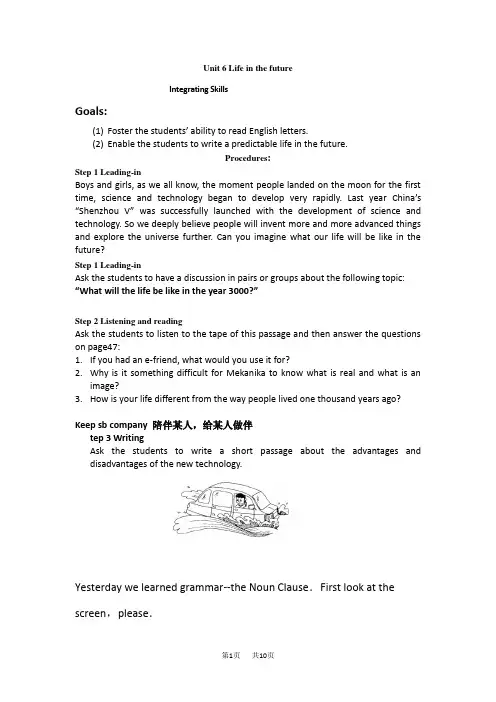
Unit 6 Life in the futureIntegrating SkillsGoals:(1)Foster the students’ ability to read English letters.(2)Enable the students to write a predictable life in the future.Procedures:Step 1 Leading-inBoys and girls, as we all know, the moment people landed on the moon for the first time, science and technology began to develop very rapidly. Last year China’s “Shenzhou V” was successfully launched with the development of science and technology. So we deeply believe people will invent more and more advanced things and explore the universe further. Can you imagine what our life will be like in the future?Step 1 Leading-inAsk the students to have a discussion in pairs or groups about the following topic:“What will the life be like in the year 3000?”Step 2 Listening and readingAsk the students to listen to the tape of this passage and then answer the questions on page47:1.If you had an e-friend, what would you use it for?2.Why is it something difficult for Mekanika to know what is real and what is animage?3.How is your life different from the way people lived one thousand years ago? Keep sb company 陪伴某人,给某人做伴tep 3 WritingAsk the students to write a short passage about the advantages and disadvantages of the new technology.Yesterday we learned grammar--the Noun Clause.First look at the screen,please.(Show the following on the screen.)1.What life will be 1ike in the future is the topic for today’s class discussion.2.Can you imagine what life will be like in the future?3.One of the questions that few people can give answer to is what life will belike in the future.T:Study the sentences and find out what kind of Noun Clause the underlined part in each sentence is.(The students prepare for a couple of minutes.Then the teacher may ask some student to say their answers.)Suggested answers:1.Subject Clause2.Object Clause3.Predicative ClauseT:Good.But generally speaking,it is hard for you to choose connectiyes in- troducing the Noun Clause.Only when you know the functions of the connectives can you use the Noun Clause as the Subject,Object,Predi-cative and Appositive freely.Now let’s do some exercises to consolidate what you have learnt.(Show the following on the screen.)Fill in the blanks with suitable connec-tives.1._______composition is the best is known to us a11.2.He wondered________he was not al-lowed to go out alone.3.______is to take Li Ming’s place is being dis cussed.4.I got very angry with______he said.5.My idea is_________we should ger more people to finish the work.6.I wonder_________it is true or not.7.The problem is___________we could help smokers kick their habit.8.The news__________we had won in the match excited all.9.We have no idea_________she was born.10.That’s________we decided to put the meeting off.Suggested answers:1.Whose 2.why 3.Who 4.what 5.that 6.whether 7.how 8.that 9.when/where lO.whyT:In this unit,we’ve also learned some u seful expressions.Do you remember them?Now let’s do an exercise to re-vise them.please look at the screen.(Show the following on the screen.)Complete the sentences,using the ex-pressions learnt in this unit.1._______his work has been good,but this essay is terrible.2.You should________your friend by let-ter.3.Please_________what I am saying.4.He always keeps several baskets of apples________.5.The misprint________great confusion.6.He_______her before she vanished(消失)into the crowd.7.His dream of being a famous singer________at last.Suggested answers:1.In general 2.keep in touch with3.pay attention to 4.in store5.led to 6.caught a glimpse of7.came trueT:In this unit,we’ve also read a passage about life in the fu ture.Now pleasethink out some words you can use to describe life in the future.(After a while,ask some students to say out the words.)Step Ⅲ Reading and WritingT:OK.As we know,people’s life hasbeen changing.It’s getting better and better.What do you think life in the 3lstcentury will be like?will it be the same as that today?Ss:No.We think life in the 3lst century will be very different from that in this century.We’ll live more easily than today.We’ll have a machine do what we want them to.The only thing we need to do is to press the buttons on the computer.T:OK.Thank you.Today we’re going to read a letter about the waypeople willlive more than one thousand years lat-er and we can know what the life in the 3lst century will be like.First let me explain some phrases to you:keep sb.Company,a bit and clear up.(Show the following on the screen.)1.keep sb.company:remain with sb.so that he is not alone.e.g.He stayed at home to keep his wife company.I’ll stay here and keep you company.2.a bit:rathere.g.He is feeling a bit tired.The book costs a bit much.3.clear up:put in order/make sth.Tidye.g.Clear up your desk before you leave the classroom.Would you please clear up the cup-board?(Bb:keep sb.Company,a bit,clear up)T:Now open your books at Page 47.Look at Reading and Writing.Here is a letter from Mekanika.Now you’re given four minutes to read it.Then answer some questions under the letter.(The students begin to read.After a while.teacher checks their compre-hension.)T:Who’d like to tell me what you would use an e-friend for,if you had one?(One students stands up.)S:Let me try.If I had an e-friend.I would let him help me with what I couldn't do,keep me company,talk with me and help me with my homework.(Another student begins to give the answer.)S:I think I would have the e-friend help me take notes when I was listening to a lecture and play chess with me.Fur-thermor,I would let my e-friend help me if I was in trouble.T:Thank you.Now the second question:Why is it sometimes difficult for Mek-anika to know what is real and what is an image?Any volunteer?S:Because the world and people are imi-tated so well that we can see them,hear them,touch them,talk to them and feel them.They are just like the real world and real people.T:OK.The last question:How is our 1ife different from the way people lived one thousand years ago?S:Now life is much easier and more con-venient than in the past.We can keep in touch with each other by cellphone or by computer insteadof by writing letters.S:We can travel by car instead of on foot.We can buy things on the Inter-net.We can also get the latest infor-mation by surfing the Internet.…Step Ⅳ Listening and Reading AloudT:Now let’s listen to the tape.When I play it for the first time,just listen carefully.When I play it for the second time,please listen and repeat.Then read the passage aloud.Pay attention to your intonation.Are you clear?S:Yes.(Play the tape for the students to lis-ten.Then when the students read the passage.the teacher goes among them and corrects their mistakes in pronun-ciation,intonation and stress.)Step V WritingT:We have known what the life will be in the year 3044.Imagine that you have come back from a trip to the future.You visited the year 4367 and you saw a wonderful invention called a Mogray.Now work with your partner and decide what a Mogray is,what it looks like and what it is used for.(Teacher asks the students to discuss the questions.And then collect theiranswers.After that,the teacher says the following.)T:Now you know what it is like.Please write a paragraph about what a Mogray is.Before writing,you have to complete the outline on the screen.(Show the following on the screen.)(Teacher asks the students to write the outline in their exercise books.Students may have various answers.)T:OK.You have finished your outline.Please use it to write your paragraph.(Teacher may let the students hand them in after class,if time is limited.)One possible version:Life in the year 4367 is quite differ-ent from life in the 21st century.We willstill do many things we do today,but we do them differently.For example,we canuse a Mogary to help us.A Mogary is an intelligent robot,which looks exactly like a human being.It can be used in many fields.such as at home,in the factory or in nature.The Mogray can be easily and con-veniently used at home.If you want to travel,you can turn it into all kinds of transport that you like,such as a plane,a car or a train,which use the solar energy without pollution.When it is too cold ortoo hot,the head of the Mogray can be used as an air—conditioner,which can keep a proper temperature.There are all kinds of recipes in its head.It can cook all kinds of healthy and delicious food for yoi if you press the buttons on it.When you are bored,it can read some books for you,which are stored in its brain.It can also play chess with you or communicate with you.It has thoughts similar to yours,Your life will be rich and colorful with a Mogray companying you.It can be used in many fields.In a word,the earth will become even more beautiful with the help of it.Step Ⅵ Summary and HomeworkT:Today,we’ve learned a passage about the life in the year 3044.At the same time,we wrote a passage about the life in the year 4367.What’s more,we’ve revised the Noun Clause and the useful expressions in this unit.such as in general,keep in touch with,in store…(Write them on the blackboard.After class,you should master them further by revising what we’ve learnt in this unit.Don’t forget to prepare for the next unit.That’s all for today.Class is over.)Step Ⅶ The Design of the Writing on the BlackboardUnit 6 Life in the futureThe Fourth PeriodUseful expressions:keep sb.company a bit clear up in general keep in touch with in store pay attention to lead to catch a glimpse of come true。
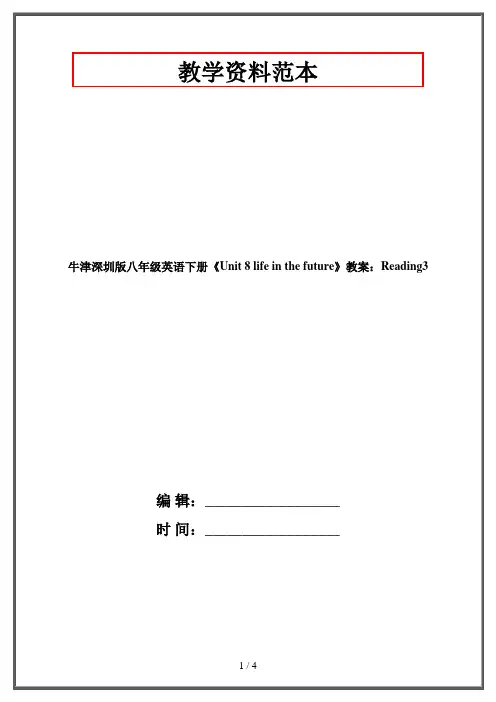
教案3课题Unit8 Life in the future 课型Reading (Ⅲ)备课时间1 period教材分析教学目标1.The students can use the expressions and the useful sentencestructures freely.2.To master some usages of some useful expressions and develop anability of how to get a further understanding of the text.教学重点Useful expressions: In the present time/at the front/ on the internet/ inthe shape of /mix with/prepare for/ in a second.教学难点 How to master them fluently?教学关键Know how to use the important phrases and expressionsto make a sentence.教法与学法指导Co mpetition, Self-study, Partner work教学环节主要教学步骤或内容学生主体活动教师活动设计意图时间分配第一环节复习回顾平移的基本性质,引入课题StepⅠ: Warming up1. Recite the text2. free talk1 .Talk about yourthoughts on futurelife. Therestaurant, theschool, theclothes….1. Askquestions:what do youthink of thelife in 2050?1.Reviewthe text aswell as trainthestudents’ability ofspeaking5第二环节观察操作、探Step Ⅱ: Detailed reading.Filling the blanks.2.Fill the blanksabout the text andfind out theuseful expressionsand structures inthe text like : Inthe present2.finish theblank fillingexerciseaccording tothe text , and miss theimportant2.Let them topay attentionto thedetails andcultivatetheir abilityof thinking.索归纳平移的作法StepⅢ:Important phrases and Sentencestructures learning. time/at the front/on the internet/in the shape of/mix with/preparefor/ in a second.3. Make sentenceswith theseimportant pointsin the text andtake notes of theexplanations ofthe importantpoints:in the shape of awhale/ is used asenergy/ sb to sb.Satisfy sb. a new typeof hydrogen car. Bemixed with. Pollutethe city.phrases anddifficultpoint in theblank fillingexercise3. Show somepictures byPPT, andexplain theusage of theimportantphrases andthe mainlanguage3.To developthestudents’ability ofcooperationand to makeevery surestudent takepart in thework.第三环节课堂练习Step VI: More practice 4. Use the right forms of theexpressions tofinish thesentences.Translate theChinese sentencesinto English byusing theimportant phrasesin the text4.Give theman example todo theexercise.work in groupto check theanswers.4. toconsolidatethe usage ofthe keypoints of thetextlet studentsuse theusefulexpressionsthey learned。
Unit 3 Life in the futureⅢ. 教材分析与教材重组1. 教材分析本单元以“Life in the future”为中心话题,旨在通过本单元的学习,让学生大胆发挥想象,对人类今后的生活环境,生活方式进行猜测,并在此基础上,对人类的种种活动进行反思,提倡环保生活意识。
同时让学生学会过去分词作定语和作状语的不同用法。
最后让学生将本单元所讨论的话题和推测手法相结合,学习怎样写report。
1.1 Warming Up 部分利用一个关于“住”和“行”的对比研究表格引导学生回顾过去,认识现在和展望未来。
通过这一活动,引发学生对过去,现在和未来的思考,使学生对将要阅读的文章有个知识准备。
1.2 Pre-reading 部分让学生充分运用发散思维,先列举当今世界人类面临的一些突出问题,然后要求学生思考为什么会产生这些问题,这些问题中哪些在未来社会仍然可能存在,哪些将会被克服,哪些将会恶化。
为下面的阅读做了铺垫。
1.3 Reading 部分通过一封发自未来的电子邮件,讲述了作者Li Qiang怎样安全到达“未来世界”,他对“未来世界”的印象,以及“未来世界”的日常生活方式和交通工具情况。
阅读时要把重点放在“未来世界”生活与当今生活的不同点上。
1.4 Comprehending 部分设计了三个教学活动来加深学生对Reading部分的理解。
第一个活动要求学生通过阅读找出“未来世界”在以下几个方面的变化:跨时空旅行,交通,住房,城镇环境和空气质量。
接着让学生在此基础上得出自己的结论,哪些变化好,哪些变化不好,并说明理由。
第二个活动要求学生通过阅读来判断Li Qiang对“未来世界”的态度是乐观的还是悲观的。
学生要在文中找出支持自己观点的论据,尽可能说服别人。
第三个活动让学生想象一下Li Qiang 将会去参加哪些活动。
这样既鼓励学生展开丰富的想象,又为Using Language 部分的语篇学习做了铺垫。
Module 1- Life in the FutureTeaching aims1. Master the words and learn how to talk about future.2. Can express your ideas about the future.Important points1. Talk about your ideal house for the future.2. Discuss the ideal house in the future.Difficult pointsDescribe your ideal house for the future.Teaching methods1. Multi-media teaching.2. Writing on the blackboard.3. Class activities: discussion in pairs and in class.Teaching procedures[Introduction]Step oneSpeaking practice:1. Lead inWhat do you know about the future? Can you describe the life in the future?In this unit, we will discuss the life in the future.First look at the pictures on screen. What do you think of these pictures?2. Look at the photographs and answer the question.3. Check the answersAsk students to do the activity in pairs, and then call back the answers in class.Finally ask students to look at the samples on screen.Step twoVocabulary practiceDo the exercises by yourself, then discuss your answers with your partner.1. Choose the building material to complete the sentences.2. Check the answers on screen.Step threeSpeaking practice:Tell the class what materials your school is made of / from.Look at the sample. You should make a list to tell us about it.☺ The building is made of steel, concrete, bricks, stones, mud, and so on.Tell the class what materials the building in the photo is of / from.☺S1. The building may be made of plastic.☺S2. The building may be made from aluminium or alnico.☺S3.The buil ding may be made from many things which we don’t know now.Step fourSum upIn today’s class, we learned how to describe the life in the future. We can tell others our ideal house in future. We should practice after class.Homework1. Discuss what life you want to have in the future with your partner.2. Summary your ideas and write them down.3. Exchange your writing with your partner.[Reading & vocabulary]Step oneSpeaking practice1. Lead inShow the pictures about the cities and ask the question.What do you think of the pictures?2. DiscussionLet’s guess what the topics, do you think, the passage will mention.alternative energy, crime, school, public service,traffic, environment, weather, entertainment3. Discuss in pairs, then choose your answer or answers and tell the class why.4. Look at the samples on screen.Step twoPre-reading1. Work in pairsAsk students to look at the questions before reading the text.☺1. What will the city of future look like?☺2. Are the cities going to get bigger or smaller?☺3. What will become very important in future? Why?☺4. What will we also have to rely more on? Why?☺5. How may we get rid of garbage problems?2. Fast readingAsk students to read the text fast as possible as they can3. Choose the best answerLook at the screen, and choose the best answer, then check the answers.The answers – C D C D DStep threeIntensive reading1. Finish the answerWhat the topics of the passage mention are ---alternative energy, crime, school, public service, environment, entertainment 2. ReadingLet’s read the passage again and learn the passage carefully.3. DiscussionLook at the questions and discuss them again, and check the answers.4. Ask students to look the sample answers on screen.☺1. What will the city of future look like?☺2. Are the cities going to get bigger or smaller?☺3. What will become very important in future? Why?☺4. What will we also have to rely more on? Why?☺5. How may we get rid of garbage problems?Step fourThe exercises1. Match the words and phrases from the text with their meanings.2. Look at the screen and check the answers.3. Match the words and phrases in the box A with those in box B.Do the exercises individually and pay attention to the words where the stress doesn’t fall on the first syllable, then match them:ar rest re cy cle al ter native ma ter ial re source ope ra tion4. Check the answers.Now check the answers against the passage. Then look at the screen.5. Fine the words or phrases in the text which mean these things.6. Check the answersCheck your answers with your partner. Then look at the screen.Step fiveSpeaking practice1. Ask and answer the question2. Check the answers☺1. They’ve thought how to run city in 2025.☺2. The garbage ships will go to the sun.☺3. Criminals.☺4. P eople won’t be allowed to smoke within a city’s limits.☺5. They will go shopping online.☺6. Their telephone number.☺7. Recreation.☺8. All cars will be powered by electricity, solar energy and wind.☺9. They will do surgery from a distance.☺10. They will go anywhere they want to go in the world.Step sixShare your ideas with others1. Discuss the questions about prediction.☺1. Which one is the strange?☺2. Which one is the most useful?☺3. Which one will come true first?☺4. Which one will come true last?Step sevenSummary☺1. When we talk about a certain future, we should use ‘be going to’.They are going to get bigger before they get smaller.☺2. When we talk about prediction, we should use ‘will be/do’.What will the city of the future look like?Homework1. Write a short passage with the title What will the life in future look like?.Pay attention to use will do and be going to do.2. Finish the exercise book.[Function, listening & speaking]Step onePresentation & Review1. Lead inIn today’s class, we will go on with talking about the future. Let’s do the exercises first, and then check your answers with your partner.2. Discuss how to talk about future.Pay attention to the future about a certain future and about predictionLet’s look at the answers on screen.3. Match the sentences A-F with the meanings 1–6.First, read the sentences A-F and the phrases in meaning 1-6. Make sure you understand all of them. Then match them and check the answers with your partner.4. Check the answers on screen in class.Step twoListening & speakingFill in the missing words of the following passage on screen according to what you here.Step threeListening1. Think about your home then ask & answer questions.When you ask and answer the questions, you should talk about these things.•size and number of rooms•furniture in the rooms•technology2. Listen to the tape.Please pay attention to the questions while you are listening, and choose the best answer.3. Listen to the passage again and check the answers.1.a2.b3.c4.b5.a6.a7.c8.cStep fourSpeaking practiceWork in pairs and ask questions while listening.1. Listen to the listening material again and ask questions.☺1. What will the house look like?☺2. How big will your house be? How many rooms will there be in your house?☺3. In what way will the house be different?☺4. What about the furniture?☺5. How will the computer control most of the functions in the house?2. Look at the possible answers on screen.Step fiveThe exercisesWork in pairs and answer the questions.1. The questions☺1. What would happen to the dinning room and the living room?☺2. How to switch on the lights?☺3. What will the toilet be able to do?☺4. What will the dishwasher be able to do?2. Check the answers on screen.3. Speaking practiceImagine your house in future & think about these things. Look at the screen. Homework1. Discuss with your partner to talk about the future life that you can imagine.2. What will the future life look like?What new technology will it have?3. Write down what you talked about with your partner.[Grammar, pronunciation & writing]Step oneGrammar1. Lead inToday we will review the future continuous.Look at these sentences on page 6.All of the statements are true except No.4.Pay attention to the verb forms of sentences, a, b and c (will be + V- ing)2. Review what we’ve learned•I will go to see the film next week.•I will be sitting in the theatre to see the film at 5:00 tomorrow afternoon.•I won’t be doing the exercise at 6:00 tomorrow morning.•I will go shopping on the moon in fifty years’ time.•I will be living in a fantastic house in twenty years’ time.3. The exerciseComplete these sentences from the interview in and check the answers on screen..4. Fill in the blanks with the verbs in brackets.5. Check the answers on screen.Step twoPronunciation1. The answer to the Ex. 1☺Twenty years isn’t a long time. We won’t be living underground or in space.We’ll be living in houses and flats just as we do today.2. The answer to the Ex. 2☺ The kitchen will become the most important room in the house! We’ll still be cooking, and we’ll probably be using the kitchen more as a family room. And bathrooms will be bigger.Step threeWriting1. Find words or phrases that mean:* I don’t know exactly. I’m not really sure.* It’s certain definitely* I hope this will happen. hopefully* It’s possible.maybe /probably* after a long time eventually2. The different ways to talk about future:* I will be doing / I will do …* I will definitely study …* I guess that I will …Step fourWriting practice1. You should follow the instructions to finish your writing.You have to use:* 1. the future continuous tense(I’ll be doing / I won’t be doing)* 2. The introductory verbs:I hope /I guess /I imagine /I’d like to* 3. The introductory words:hopefully / eventually / maybe / definitely2. Look at the sample writing (109 words) on screen.Step fiveEveryday English1. Do the exercises individually and then check with your partner.2. Check the answers on screen.Homework1. Review what we’ve learned in the unit.2. Do the exercise book.[Cultural corner]Step oneLeading in1. Reading and thinkingRead the questions and decide which prediction made in the past is the most amusing.2. DiscussionWork in pairs and tell your partner your idea.Step twoWriting practice1. Write 5-7 sentences about life in China in the future.2. Look at the samples on screen.Step threeTask1. Describing your ideal house for the future according to the questions:➢Where is your ideal house?➢What is it made of?➢How big is it?➢Will your ideal house be interesting?➢Describe the interesting feature of the house please.2. Look at the possible answers on screen.Step fourSummaryIn this unit, we learned ways of talking about future. When we talk about the future, we should pay attention to use will do/be or will be doing to make predictions.The samples:☺1. What will the city of the future look like?☺2. They are going to get bigger before they get smaller.Homework1. Talk about your ideal house and say something about the feature for the house.2. Finish the exercise of this unit.。
Unit 3 life in the future本单元以life in the future 为中心话题,旨在通过本单元的学习,让学生大胆发挥想象,对人类今后的生活环境,生活方式进行猜测,提倡环保生活意识,同时让学生学会过去分词作定语和作状语的不同用法,最后让学生将本单元所讨论的话题和推测手法结合,学习怎么样写report本单元所涉及的要点有:1.学习并了解未来生活的各个方面用与现在生活的不同之处,学习外星人的生活方式。
2)学习表示预测,建议的的句型。
(3)学习过去分词作定语和状语的结构。
(4)学习写好“report”,以训练学生的逻辑思维及写作能力.The 1st PeriodTeaching Aims:1. Learn some new words and expressions.2. Help the students to talk about life in the past, at present and in the future.3. Enable the students to describe the life in the past, at present and in the future.Difficult and Important Points:Compare life in the past, at present and in the futureWhat is life in the future like? What changes will take place?Teaching Methods:1. First and careful reading,2. Asking and answering question activity3. Individual, Pair work & group workTeaching Procedures:Step 1 warming upTalk about how many changes there have been in the last one thousand years. And what changes we might expect to find in the next one thousand years Step two: pre-reading1.Can you tell what problems people are facing today?2.what problems do you think people in the future will have overcome?Which ones will still be there or evenworse in AD3005?Key: 1The problem of population will be solved,have begun to Control the birth rate.2The problems will be still there,and will even worse.3I don’t think so.Now scientists are trying their best todevelop new resources that human beings can make use of ,such as solar energy.In my opinion……step three fast readingRead the text for the first time and tell what the text is about?It’s an e-mail written by a man Who has taken up a trip to the future.2. Look at the following sentence, there are in wrong order, tell me the correct order for these sentenceA. We were transported into the future by a comfortable time capsule.B. I arrived a t Wang Ping’s home and everything in his house made me surprised.C.I won a travel to the year AD3005D. I have my first try to master a hovering carriage.Step four careful reading1.why did I have the chance to travel to the year AD3005?2. What is a “ time lag”?3. How did I feel when I was in the capsule?4who guides my trip?5.why did my guide give me some tables?6.who transported us to the future?Key 1. I took up the prize I won the year before.2. “Time lag”means a person gets flashbacks from his previous time period.3. The seats in the capsule are very comfortable.4. My friend Wang Ping is my guide to the future.5. The tablets could help me feel less nervous and uncertain6. Wan g Ping’s parents’ company transported us to the future.1How did I feel as soon as I was transported to the future?After the writer was transported to the future,he was hit by the lack of fresh air.2.how did Wang Ping solve this problem?Wang Ping gave a mask to the writer and hurried him through to a small room nearby to have a rest.3.what do you think has caused this kind of problem?Now we are causing more and more pollution to the nature,this will cause serious problems to life in the nature.This may be the cause of the lack of fresh air in the future.1 What did Wang Ping’s house look like?His house is a large bright ,clean room.It had a green Wall,a brown floor and soft lighting .2 What was the green wall made of? What’s the purpose of build ing this kind of green wall?The green wall was made of trees.The leaves of the trees will providemuch-needed oxygen to the house.3 How can you produce a TV set in Wang Ping’s house?You can just flash a switch on the computer screen and a TV set will rise from the floor.Sample answers Ex.2I think the writer has an optimistic view of the future.He was very excited when he traveled to the year AD 3005 an d couldn’t elie ve if was true.From this,we can see he is eager to go to the future.Though ehe was hit by the lack of fresh air,。
Module 5 Unit 3 A healthy life单元教学目标Content analyze:本单元以健康话题为主题,听说读写等活动主要围绕如何健身,怎样成为健康人展开,其中涉及许多社会热点问题,如抽烟,吸毒,艾滋病,学习与工作压力等影响健康的棘手问题。
本单元引导学生讨论这些问题,目的在于让他们远离有损健康的活动,并养成良好的习惯。
一、技能目标 Skill Goals◆Talk about health◆Learn the harm of smoking and how to stop smoking◆Learn to advise people about what to do and what not to do◆Learn about AIDS and how to keep safe from HIV二、语言目标(一)功能句式How to advise people about what to do and what not to do◆Do/don’t…◆Don’t forge to…◆It is not/would be a good idea to…◆You should…◆Yo u don’t have to…◆Mind your head/step!◆It’s OK/all right to…(二) 词汇(三) 语法The use of it(四)重点句子The 1st period Warming up and pre-readingTeaching aims:1. Talk about health2. Learn the issues that the young people are concerned about3. Learn to advise people about what to do and what not to do4. Talk about smoking and its harmTeaching procedures:Step one Warming upThis step is to lead the students to the topic of this unit ―― A healthy life 1.What health issues do you think concern young people the most?(After about 3 minutes)A sample list:Cigarette smoking Drinking alcohol Drug taking Diet Physical fitness Sexual health Stress AIDS and infections Cancer Anxiety and so on2. Group worka. Choose one health issue you think is particularly important.b. List five things you would like to tell other people about this issue.*Show some pictures on the computerDirections:Looking at the following pictures. What are they doing ?Which are healthy activities while which are unhealthy activities?(Ask the students to describe the pictures using their own words) Straightforward description:Picture one:They are Singing. HealthyPicture two:They are Dancing. HealthyPicture three:They are Playing basketball. HealthyPicture four:They are Doing Taiji. HealthyPicture five:They are Drinking alcohol. HealthyPicture six:They are Eating too much. UnhealthyPicture seven:They are Smoking, coughing. UnhealthyStep two Pre-reading*Questions:1. Have you ever smoked? If you have, have you ever tried to stop?2. Why do you think some adolescents start smoking?Possible answer:Some adolescents start smoking because they are falsely influenced by some media.Some think it’s cool. Maybe some want to lighten some stress.3. In what ways is smoking harmful?Mentally and healthily.4. What advice would you give to someone when wanted to stop smoking?Possible answer:Let them get interested in some positive hobbies like sports, playing music, reading, playing chess and so on.5. Where could you get good advice on stopping smoking?Step three HomeworkFind out some information from the Internet and write a short passage about the present situation of young people’s smoking in China as well as giving them some advice.The 2nd period ReadingTeaching aims:1.To promote the students’understanding of the text.2.To solve the problems and difficulties they meet in understanding the text bycooperation.3. Enable the Ss to learn how to give advice on stopping smoking.4. To talk about the importance of health and the harmful effects of smoking Teaching methods:Discussion, cooperative learning and oral practice.Teaching procedures:Step one Greetings.Greet the Ss as usual.Step two Pre-readingPredicting:Read the title of the text and the headings within it, and find out:1. Who wrote the letter?2. What is the purpose of the letter?Step three Skimming1. Read and check the answers to the two questions.2. Listen to the tape and find out the main idea of each paragraph.A. The writer leads to the topic of the letter by talking about James’ problem ofsmoking.B. Introducing some different ways of becoming addicted.C. Telling the writer’s hope for his grandson and advice on stopping smoking.D. Telling the harmful effects of smoking.E. From the life the writer is leading now, we can know the importance of healthylife.Keys: 2—A 3----B 5-----C 4-----D 1-----EStep four Detail reading1. List the details under the following subtitles.The ways to become addicted to cigarettesThe harmful effects of smokingSuggestions to quit smokingThe ways to become addicted to cigarettes1).Become physically addicted to nicotine2).Become addicted through habit3).Become mentally addictedThe harmful effects of smoking1). Do terrible damage to your heart and lungs2). Have difficulty in becoming pregnant3). Affect the health of non-smokers4). Smell terrible5). Have the ends of the fingers turn yellow6). Be unable to run fastSuggestions to quit smoking1). Prepare yourself2). Be determined3). Break the habit4). Relax5). Get help If you need it6). Keep trying2. Answer some questions. ( refer to PPT)4.Let students find the expressions in the passage that can be used to advise people about what to do and what not to do.Step five DiscussionSituation 1: Suppose you are a teacher, how will you persuade your students to quit smoking.Situation 2: Suppose your teacher is a smoker, how will you persuade him to quit smoking.Situation 3: Suppose you are a father, how will you persuade your son to quit smoking. Situation 4: Suppose your father is a smoker, how will you persuade him to quit smoking.Step six Homework1. Discuss the questions after class.2. Find out the key points of the text.3. Search some more information about the harmful effects of smoking and advice onstopping smoking.The 3rd Period Listening& SpeakingTeaching aims:1. To learn what should be paid attention to when going to the party and how to give advice and warnings to others.2. To train the ability of listening and speaking.Teaching procedures:Step one Listening1. Pre-listening1) Individual work:To show some pictures and make students judge which are the ways of keeping a health life.2) Group work:Discussion: Suppose you are invited to have a party in a nightclub by your friends,would you like to go there? If not, what are you worried about?2.While-listening1)Listen to what Tina and Sara are talking about and tick the things Sara is worriedabout.2)Listen again and complete Tina’s sentences.3)Listen to the tape for the third time. Understand the whole dialogue fully andcheck if the answers are complete, especially pay attention to different structures of giving advice.3.Post-listening1)Guessing: Will Sara still be nervous about going after listen ing to Tina’sadvice?2)To ask students what useful expressions we can use to give advice and teacherwrite them on the blackboard.Step two Speaking1.Review the target function by giving students two situations.Situation1: Your friend is worried about theEnglish test the class is having on Friday. (giving some advice)Situation2: Your friend tries to cross the road and you see a car speeding towards him/ her.(giving some warnings)2.Have a discussion to make students list the rules for behavingproperly in the party and share the lists with all the classmates.Step three Homework:1. Review the expressions of giving advice, warnings and prohibitions.2. Write a short passage to persuade one of your relatives to give up smoking. The 4th Period Learning about languageTeaching aims:1. To get students to learn and master the usage of the new words and the useful expressions in the reading.2. To enable students to grasp the grammar: the use of “it”.Teaching procedures:Step one ReviewReview the main idea of the letter and the suggestions to quit smoking orally. Step two Word study1.Find words and expressions from the text and match.accustomed feeling foolish or uncomfortable because of somethingmanage stop doingashamed having an unborn child or young in the bodyautomatically pressure caused by the problems of living, too much work, etc. quit done without conscious thought, esp. as a habitstress in the habit of; used topregnant because ofmental succeed in doingadolescents of the minddue to a boy or girl in the period between being a child and an adult.plete the text with words from above. (Ex 1,P 20)1. Rice production has increased greatly in china over the last few years, largely _______super hybrid rice.2. Having lived in Hawaii all his life, he was not __________to the cold of Northern Europe.3. He was_________ of his body so he decided to go on a diet and do more exercise.4. In spite of her wounded leg, she ________to get up the stairs.5. He told me the same story _____________ until I felt like screaming.6. With exams only a week away, I am under a lot of ______.7. When I ____________playing sport I become very fat and unhealthy.8._______health is as important as physical health.9. Now that I am __________ I eat a good diet because I want my baby to be born healthy.10.___________often take more risks than adults.Keys: 1.due to 2. accustomed 3. ashamed 4.manage 5.automatically 6.stress7.quit8. Mental 9. pregnant 10.Adolescents3. Complete the text with words from below. (Ex 2, P21)Before filling in the blacks, review the meaning of each with the whole class. adolescents 青少年 cigarettes 香烟quit 停止,戒 drugs毒品due to 归因于 stress压力eventually 终于 alcohol酒addicted 上瘾的 manage管理,努力做Smoking ________, drinking ______or taking other_______ produce many harmful effects and have no real benefits. So why do __________do it? Some because they believe it makes them look cool. Others think it will help with _________in their life possibly_____ pressure from their parents or teachers. Some just want to see what it is like. What they don’t realize is that they will get into the habit and ________become _______. It will then be difficult to _____the habit. A few people ________to quit easily but for many it is a very painful process. Of course, the best way to deal with these drugs is not to start in the first place.Keys: 1. cigarettes 2. alcohol 3. drugs 4. adolescents 5. stress 6. due to 7.eventually 8.addicted 9.quit 10.manageStep three Discovering useful structures1. Go over the first reading passage again and find out all sentences with “it”.a. It’s a beautiful day here---b. It’s a mazing that at my age I am still fit enough to cycle 20 kilometres in an afternoon.c. It’s my birthday in two weeks time---d. Your mother tells me that you have started smoking and that you are finding it difficult to give up.e. Believe me, I know how easy it is to begin smoking and how hard it is to stop.f. This means that after a while your body becomes accustomed to having nicotine in it and ---g. As you know, if you do the same thing over and over again, you begin to do it automatically.h. I think I was addicted in all three ways, so it was difficult to give up.i. I didn’t know it could do terrible damage to your heart and lungs or that I was more difficult for smoking couples to become pregnant.j. When I was taken off the school football team because I was too slow, I knew it was time to quit smoking.k. It might help you to stop.2. Discuss with their partner about the use of“it” (pairwork)3. Explain the use of it.“It” can be used in the subject position to stand for an infinitive, -ing form or a clause.Impersonal “it” can be used to talk about time, date, distance or weather4. Let students sort all the sentences.It stands for an infinitive: h.It stands for-ing formIt stands for time: c.It stands for date:It stands for distance:It stands for weather: a.It stands for others: d, e, f, g, I, j, k5. Explain and extend.It stands for an infinitive: h.I think I was addicted in all three ways, so it was difficult to give up.真正的主语to give up it形式主语 structure: it is+ adj.+ to do---补充1.手头边有个小笔记本是个好主意。